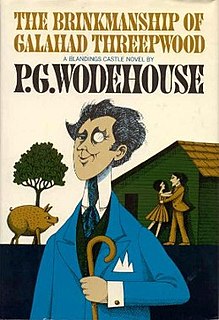Related Research Articles

Hermione Jean Granger is a fictional character in J. K. Rowling's Harry Potter series. She first appears in the novel Harry Potter and the Philosopher's Stone (1997), as a new student on her way to Hogwarts. After Harry and Ron save her from a mountain troll in the girls' restroom, she becomes best friends with them and often uses her quick wit, deft recall, and encyclopaedic knowledge to lend aid in dire situations. Rowling has stated that Hermione resembles herself as a young girl, with her insecurity and fear of failure.

In Greek mythology, Orestes or Orestis was the son of Clytemnestra and Agamemnon, and the brother of Electra. He is the subject of several Ancient Greek plays and of various myths connected with his madness and purification, which retain obscure threads of much older ones.
Tisamenus, in Greek mythology, was a son of Orestes and Hermione, daughter of Menelaus, or Erigone, daughter of Aegisthus who were first cousins twice over, so Tisamenus had only five great-grandparents, instead of the usual eight. Tisamenus succeeded his father to the thrones of Argos, Mycenae and Sparta.

The Winter's Tale is a play by William Shakespeare originally published in the First Folio of 1623. Although it was grouped among the comedies, many modern editors have relabelled the play as one of Shakespeare's late romances. Some critics consider it to be one of Shakespeare's "problem plays" because the first three acts are filled with intense psychological drama, while the last two acts are comic and supply a happy ending.

In Greek mythology, Hermione was the daughter of Menelaus, king of Sparta, and his wife, Helen of Troy. Prior to the Trojan War, Hermione had been betrothed by Tyndareus, her grandfather, to her cousin Orestes, son of her uncle, Agamemnon; she was just nine years old when Paris, son of the Trojan king Priam, arrived to abduct her mother, Helen.

Hermione Youlanda Ruby Clinton-Baddeley was an English actress of theatre, film and television. She typically played brash, vulgar characters, often referred to as "brassy" or "blowsy". She found her milieu in revue, in which she played from the 1930s to the 1950s, co-starring several times with the English actress Hermione Gingold.
Hermione Cobbold, Baroness Cobbold, known as Lady Hermione Bulwer-Lytton until 1930, was the British matriarch of Knebworth House and wife of Cameron Fromanteel Cobbold, 1st Baron Cobbold.

Orestes (408 BCE) is an Ancient Greek play by Euripides that follows the events of Orestes after he had murdered his mother.

Galahad at Blandings is a novel by P. G. Wodehouse, first published in the United States on 31 December 1964 by Simon & Schuster, Inc., New York under the title The Brinkmanship of Galahad Threepwood, and in the United Kingdom on 26 August 1965 by Herbert Jenkins, London.

Noma Dumezweni is a British actress. In 2006, she won the Laurence Olivier Award for Best Performance in a Supporting Role for her performance as Ruth Younger in A Raisin in the Sun at the Lyric Hammersmith Theatre. In 2017, she won the Laurence Olivier Award for Best Actress in a Supporting Role for her performance as Hermione Granger in the original West End run of Harry Potter and the Cursed Child; she reprised the role for the show's original Broadway run and, in 2018, was nominated for the Tony Award for Best Featured Actress in a Play.
Polycrates of Argos, son of Mnasiades, was a Ptolemaic commander at the Battle of Raphia, as well as a governor of Cyprus and chancellor of the Ptolemaic Kingdom in the late third and early second centuries BC.
Polycrates may refer to:
Baminnahennadige Shanudrie Priyasad is a Sri Lankan actress, dancer and singer, who appears in Sri Lankan films and television shows. She began her acting career as a child artist.
HMS Janus was the Dutch fifth-rate Argo, built at the dockyard of the Amsterdam Admiralty, and launched in 1790. HMS Phoenix captured her on 12 May 1796. The British Royal Navy took her into service as HMS Janus. She was a receiving ship by 1798 and in Ordinary by 1807. The Navy sold her in 1811.
Hermione or Hermium or Hermion was a town at the southern extremity of Argolis, in the wider use of this term, but an independent city during the Classical period of Greek history, and possessing a territory named Hermionis (Ἑρμιονίς). The sea between the southern coast of Argolis and the island of Hydra was called after it the Hermionitic Gulf, which was regarded as distinct from the Argolic and Saronic Gulfs.
Zeuxo of Cyrene daughter of Ariston of Cyrene won the harma polikon at the Panathenaia of 198BC Zeuxo's husband Polykrates of Argos, son of Mnesiades, was victorious at the same Panathenaia, their daughters, Eukrateia, Hermione and -Zeuxo, were also victorious at Panathenaia of 170-169 BC.
Zeuxo daughter of Polykrates of Argos won the harma polikon in the Panatenaia of 202 BC. Her sisters: Eukrateia and Hermione were also victorious at the same Panathenaia her father Polykrates and mother, also named Zeuxo, were victorious at the Panathenaia as well. Zeuxo was also victorious at the panathenaia in 182 BC.
Eukrateia, daughter of Polykrates of Argos, won synoris teleia in the Panathenaia of 202 BC. In the same year her sisters also won: Hermione with 4 horse chariot and Zeuxo with colt drawn chariot.
References
- ↑ "Hermione daughter of Polykrates from Argos (Argeia)". Connected contests: Ancient athletes online.